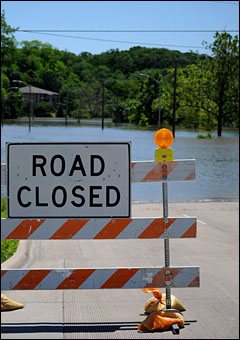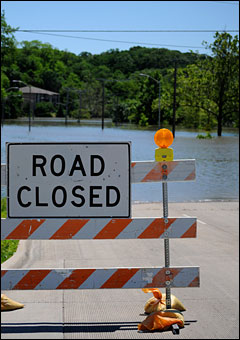
Roads and restaurants may be closed, but Iowa is getting back on its feet.
Photo: Kurt Michael Friese
The weather here in Iowa City has been gorgeous for more than a week. Is Mother Nature trying to make amends? While she smiles on us, she’s still causing trouble for our friends to the south. The horrendous flooding continues, breeching nearly every levee it encounters in Missouri and Illinois, and leaving behind a litany of statistics that indicate the millions of lives affected. In Iowa alone, we’ve got 36,000 new homeless folks, and 3 million inundated acres of farmland. And then there’s the effect on small business owners — hundreds, too many of them my fellow restaurateurs, whose shops are closed until further notice.
Like the vast fields of corn and soy now polluted by the same river water that was polluted by the chemicals sprayed on those fields, no one can tell which of the restaurants will stay afloat and which will go under forever. By my own count, some 32 restaurants were directly or indirectly affected in Iowa City alone. In nearby Cedar Rapids, every single downtown restaurant was flooded.
During the torrential rains that led to these floods, one could often hear a common Iowa expression: “Nice day … if you’re a duck.” It has occurred to me that restaurant owners, who to a person thrive on chaos, are much like another duck-related cliché: “Smooth as glass on the surface, and paddling like mad underneath.”
If you’ve ever worked in a restaurant — a well-run one, anyway — then you know the sort of organized mayhem I mean. Dedicated restaurant professionals are seldom happy unless they’re contending with a crisis of some sort. And so today, we have a lot of oddly content people in devastated restaurants doing what they do best — hacking their way out of the weeds. Improvise, adapt, overcome: the motto of the restaurateur.
The farmers who supply my restaurant and others have different dilemmas. Those who were directly affected are in recovery mode, cleaning up and hoping their fields dry out soon enough to get a last ditch crop in the ground. Those who escaped the floods are finding many of their customers out of business, homeless, or both. Any of the farmers markets that set up near any of the rivers, such as in Des Moines or Burlington, are closed — some for a week, some indefinitely.
While the short-term recovery is underway, my community and the rest of those throughout the Heartland hit by these record-breaking floods need to look to the medium- and long-term as well. Of course, there are large-scale arguments — about shoring up levees or whether we should have them at all, developments on floodplains and who does and doesn’t deserve flood insurance or river views — but I mean more tangible, less philosophical or political.
The best way for people to help with longer-term recovery efforts is to vote with their dollars. Pay special attention to buying locally now more than ever, lest those dollars go the way of the floodwaters, emitting old Ross Perot’s “giant sucking sound.” We should be dining in the local restaurants that were not affected (yes, even mine) so that they can continue to buy from local farmers and artisans, in turn keeping them going so they can supply the flooded restaurants once they return. And when those places do return, they should see a flood of a different kind: supportive patrons eager to help get things back to some semblance of normalcy for the staffs of these great establishments. Cooks, bussers, servers, and hosts would much rather be coping with the craziness of a busy Saturday night than digging barstools out of two feet of muck.
All of you in the wider world can help, too. Slow Food’s Terra Madre Relief Fund was established especially for this purpose. In the wake of hurricanes Katrina and Rita, the fund was created not only to support the sustainable farmers, anglers, and artisans of the Gulf, but also to be a sustainable fund in and of itself, to help other regions as disasters strike elsewhere in the U.S. After those hurricanes, for example, the fund helped Kay and Ray Brandhurst get the engine replaced on their trawler, so they could in turn help revive the sustainable shrimping business in the Gulf and supply food for their friends and neighbors.
Now the fund is turning its attention to the Heartland, and I hope you will give generously. If you happen to be in the area, perhaps for our Jazz Festival on the Fourth of July, then I also encourage you to come to my restaurant, Devotay, for our flood-relief dinner.
Iowa will not be the same after this flood — but it could indeed be better. We are a resilient, hardworking, tightly knit community, and are quite adept at finding virtue in adversity. While we are often proud and stubborn, we are not so much so that we dare not ask for help. Nor are we shy with our gratitude.
Here’s a recipe for just one of the dishes we’ll serve on Independence Day.
Applewood-Smoked Trout Mousse
1 tablespoon prepared horseradish
3/4 cup heavy cream, or as needed
Juice of 1 lemon (about 2 tablespoons)
1/4 teaspoon white pepper
Remove all skin and pin bones from trout filets.
In a food processor, chop the trout fine, until it resembles breadcrumbs. Remove to a large bowl, and carefully fold in remaining ingredients. Adjust amount of cream to desired consistency. Chill one hour to overnight and serve with crostini or crackers. Garnish, if you like, with capers and lemon slices.



